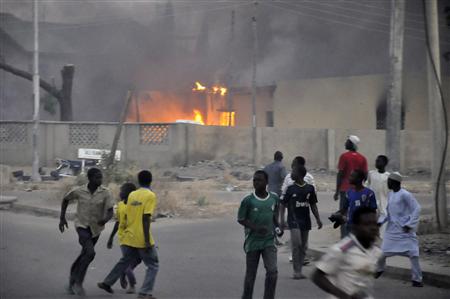
About 150 people have been killed during the co-ordinated attacks by Islamist militants in the northern Nigerian city of Kano on Friday, witnesses and reports say.
Hospitals are struggling to deal with the numbers of killed and injured.
A series of explosions ripped apart police buildings, passport offices and immigration centres on the city, which is now under a 24-hour curfew.
Boko Haram militants said they carried out the attacks, which would be their bloodiest assault to date.
The group has said it wants to overthrow the national government and install an Islamic state.
Its members have frequently attacked police stations and other symbols of state power, but the group has also bombed churches and killed hundreds of people – including many Muslim and Christian civilians.
President Goodluck Jonathan promised that the perpetrators would “face the full wrath of the law”.
“As a responsible government, we will not fold our hands and watch enemies of democracy, for that is what these mindless killers are, perpetrate unprecedented evil in our land,” Goodluck Jonathan said.

On Saturday in Kano, a city of nine million people, most of them Muslims, Red Cross teams have been collecting bodies from the streets and taking them to mortuaries.
A medical official told the AP news agency that 143 people had been killed, and another official told AFP that 162 bodies had been counted.
Boko Haram, which loosely translates from the local Hausa language as “Western education is forbidden”, has been behind a string of attacks in recent years.
The group wants Islamic law across Nigeria, whose population is split between the largely Muslim north, and the south where Christianity and traditional beliefs predominate.
It first hit the headlines in 2009 when a spate of attacks by its followers on police and government buildings in the city of Maiduguri led to a crackdown in which hundreds died.
More recently, the group has launched bomb attacks on churches, drive-by shootings on government targets and other attacks across northern Nigeria, killing scores and forcing many more to flee.
But the Kano attacks appear to be the group’s most deadly co-ordinated assault.
The police said in a statement that four police stations around the city, the headquarters of the State Security Service (SSS), as well as passport and immigration offices had been targeted.
There was also a shoot-out at the headquarters of the state police in the city’s eastern district of Bompai, reports said.
A local man, Andrew Samuel, described the scene of one blast: “I was on the roadside and I just heard a ‘boom’. As I came back, I saw the building of the police headquarters crashing down and I ran for my life.”
Witnesses said the bomber who attacked one of the police stations pulled up outside the building on a motorbike, dismounted and ran inside holding a bag.
Some unconfirmed reports have claimed suicide bombers carried out some of the attacks.
Nigeria’s Channels TV said in a statement that one of its reporters, Enenche Akogwu, had been killed in the attacks.
It said he had been “shot by unknown gunmen suspected to be members of the Boko Haram sect”, outside the state government house.
The wounded were reported to include foreigners from an area near the SSS headquarters, which is home to many expatriates, particularly Lebanese and Indians.
A Boko Haram spokesman, Abul Qaqa, told journalists that it had carried out the attacks because the authorities had refused to release group members arrested in Kano.
[youtube j1XOaw_u0dM]